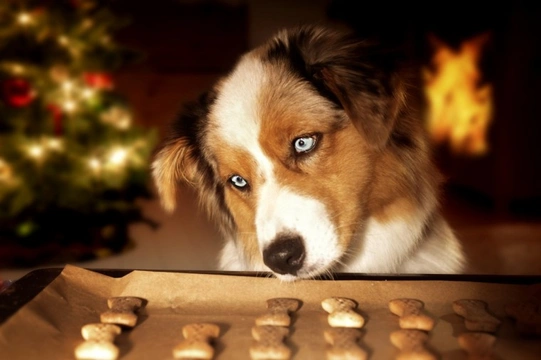
Christmas, chocolate and dogs do not mix
If you’ve ever met anyone who didn’t like chocolate or if you are yourself said person, you’re very unusual; and chocolate is of course something that we as humans should enjoy in moderation in order to avoid piling on the pounds, not to mention rotting our teeth!
Dogs more or less universally find chocolate to be every bit as delicious as we humans do too, but unfortunately whilst chocolate is not exactly good for humans, when it comes to dogs, it is outright dangerous.
Very few dog owners are completely unaware that chocolate is toxic to dogs, and most of us try hard to ensure our dogs don’t get their paws on any! However, with the best will in the world, dogs can be incredibly enterprising about eating things they shouldn’t, and chocolate is one of the most commonly ingested hazards that vets treat dogs in the UK for every year.
Christmas is a particularly risky time of the year when it comes to dogs and chocolate too, because we tend to have lots of it around in different forms, and are often quite distracted about it; which gives the average food-obsessed dog plenty of opportunities to chow down on it and potentially risk chocolate poisoning and a costly and worrying trip to the vets.
Dogs, Christmas and chocolate can be a dangerous combination, and one that all dog owners should take pains to mitigate against. This article will share five eye-opening statistics about Christmas, dogs and eating chocolate that should convince you to be extra vigilant about keeping your dog out of the Quality Street this year! Read on to learn more.
Over a quarter of all cases of chocolate poisoning in dogs occur in December
Chocolate is something many of us have around at every time of the year, but it is certainly fair to say that we tend to get through more of it at Christmas! Coupled with this, the festivities in general mean we’re a bit less vigilant about supervising our dogs, and where we leave food.
All of this means that based on statistics collated by pet insurance company Animal Friends in 2017, 27% of all chocolate poisoning presentations in dogs occur during the month of December. Unsurprisingly, the next busiest month in terms of chocolate poisoning incidents in dogs is the month during which Easter falls in any given year, followed by February with Valentine’s Day!
Every Christmas, around 2,000 dogs have to make a trip to the vets due to ingesting chocolate
Based on the data from Animal Friends, around 2,000 dogs need to visit the vet over the Christmas period due to having eaten chocolate.
This is nobody’s idea of a great way to spend Christmas day, and even if your dog ends up being fine, your bank balance is apt to take quite a hit! On which note…
The average vet’s bill for treating chocolate poisoning in a dog is around £300 – not factoring in any out of hours charges
If your dog does ingest chocolate at Christmas, getting them to the vet very promptly means the least intrusive form of intervention (such as inducing vomiting in a safe, controlled setting, which you should not attempt to do at home) and the greatest chances of your dog recovering. It also means the lowest bill at the end of it all!
So, what is the average vet’s bill to treat chocolate poisoning in dogs? Based on the Animals Friends data once more, the average cost is £297 per incident. However, this does not factor in the premium charged for out of hours care, such as would be billed on Christmas day or Boxing day, which will hike up the final bill quite significantly.
Just 750g of milk chocolate can cause seizures in a large dog
750g of chocolate is quite a lot of chocolate all told. For instance, tubs of popular Christmas sweets like Quality Street can vary in size (and seem to get smaller each year!) but average between 650g-800g each, so if you think of a tub of that type you have a rough idea of what 750g or so of chocolate might look like.
This is, as mentioned, a lot; but at Christmas a fair number of us could make a sizeable dent in such a tub in one sitting, and the average dog would have absolutely no problem gorging the whole tub, wrappers and all, in a couple of minutes.
750g of milk chocolate (which contains far less toxic theobromine than dark chocolate) can result in dangerous seizures developing in even a large dog breed like a Labrador retriever according to data published by Petssupermart; and the Labrador also happens to be a breed that is highly food-oriented and particularly likely to eat anything they get the chance to.
Smaller dogs will of course become sicker after ingesting a much smaller amount of chocolate.
Cases of chocolate poisoning in dogs are actually on the rise
Very few pet owners don’t know that chocolate is dangerous to dogs, and whilst you can’t always stop accidents from happening, better awareness tends to result in better safety.
However, when it comes to chocolate poisoning and dogs, cases of this happening have actually increased rather than fallen over the last few years. Animal Friends’ statistics indicate that since 2014, cases of chocolate poisoning in dogs across the UK increased by a massive 138% between then and 2016, which in its turn saw a jump up of 25% between then and 2015 alone.
This trend is also reflected in the December-specific cases of chocolate poisoning in dogs; which should give all owners pause to think about the potential impact of this, and how to mitigate it in their own homes this festive season.
Stay safe!



